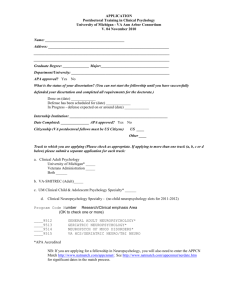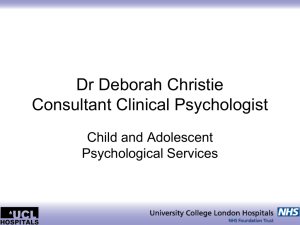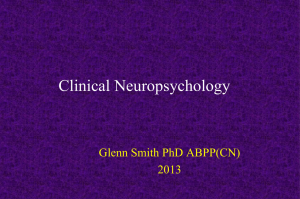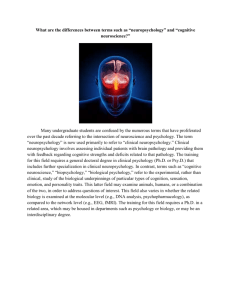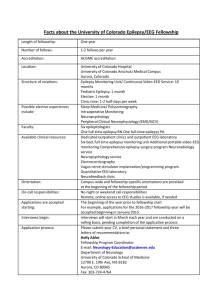ACH 2015-2016 NP Fellowship Brochure.vers3
advertisement
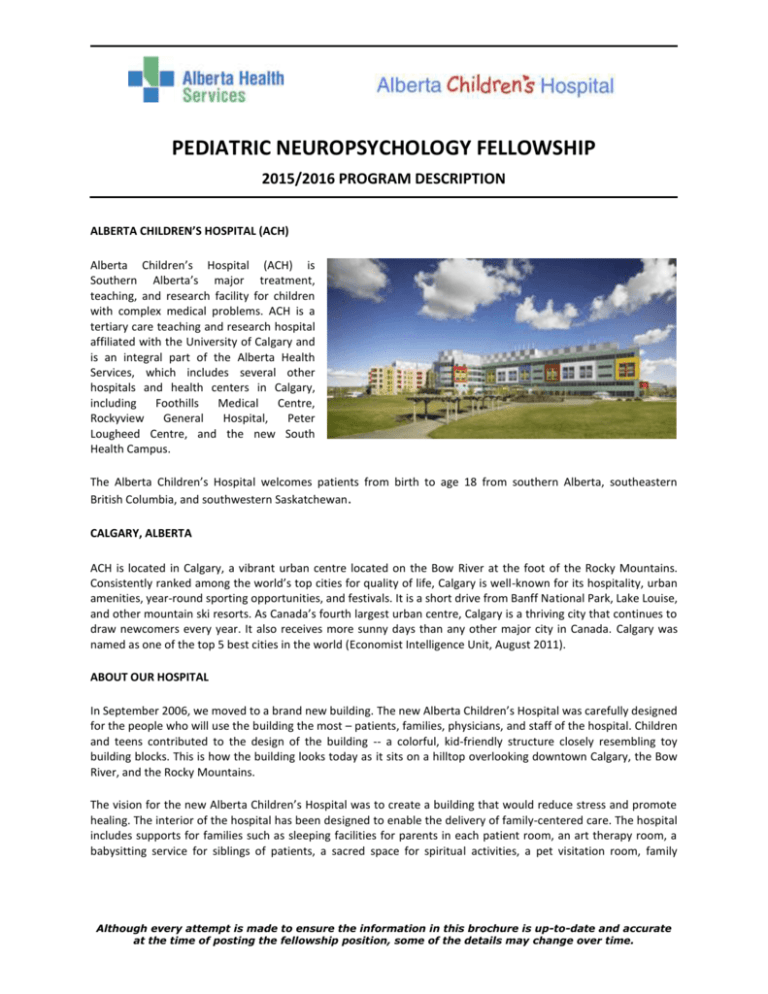
PEDIATRIC NEUROPSYCHOLOGY FELLOWSHIP 2015/2016 PROGRAM DESCRIPTION ALBERTA CHILDREN’S HOSPITAL (ACH) Alberta Children’s Hospital (ACH) is Southern Alberta’s major treatment, teaching, and research facility for children with complex medical problems. ACH is a tertiary care teaching and research hospital affiliated with the University of Calgary and is an integral part of the Alberta Health Services, which includes several other hospitals and health centers in Calgary, including Foothills Medical Centre, Rockyview General Hospital, Peter Lougheed Centre, and the new South Health Campus. The Alberta Children’s Hospital welcomes patients from birth to age 18 from southern Alberta, southeastern British Columbia, and southwestern Saskatchewan. CALGARY, ALBERTA ACH is located in Calgary, a vibrant urban centre located on the Bow River at the foot of the Rocky Mountains. Consistently ranked among the world’s top cities for quality of life, Calgary is well-known for its hospitality, urban amenities, year-round sporting opportunities, and festivals. It is a short drive from Banff National Park, Lake Louise, and other mountain ski resorts. As Canada’s fourth largest urban centre, Calgary is a thriving city that continues to draw newcomers every year. It also receives more sunny days than any other major city in Canada. Calgary was named as one of the top 5 best cities in the world (Economist Intelligence Unit, August 2011). ABOUT OUR HOSPITAL In September 2006, we moved to a brand new building. The new Alberta Children’s Hospital was carefully designed for the people who will use the building the most – patients, families, physicians, and staff of the hospital. Children and teens contributed to the design of the building -- a colorful, kid-friendly structure closely resembling toy building blocks. This is how the building looks today as it sits on a hilltop overlooking downtown Calgary, the Bow River, and the Rocky Mountains. The vision for the new Alberta Children’s Hospital was to create a building that would reduce stress and promote healing. The interior of the hospital has been designed to enable the delivery of family-centered care. The hospital includes supports for families such as sleeping facilities for parents in each patient room, an art therapy room, a babysitting service for siblings of patients, a sacred space for spiritual activities, a pet visitation room, family Although every attempt is made to ensure the information in this brochure is up-to-date and accurate at the time of posting the fellowship position, some of the details may change over time. PEDIATRIC NEUROPSYCHOLOGY FELLOWSHIP (2015/2016) resource library, and vast outside space that includes Healing Gardens and several outdoor play structures. There is also an outdoor staff garden area, staff fitness room, library, and video and teleconferencing facilities. NEUROPSYCHOLOGY AT ALBERTA CHILDREN’S HOSPITAL Within this multidisciplinary and collaborative healthcare environment, neuropsychologists function as consultants and provide a wide range of clinical services. In the Neurosciences program, this includes neuropsychological assessment of children with a variety of neurological conditions such as intractable epilepsy, traumatic brain injury, brain tumours, hydrocephalus, cerebrovascular conditions, genetic disorders, and infectious diseases such as encephalitis and meningitis. Children are generally seen as part of comprehensive multidisciplinary investigations requested by treating neurologists, neurosurgeons, pediatricians, and physiatrists from a variety of clinics and programs including: □ □ □ □ □ □ □ Refractory Epilepsy Traumatic Brain Injury/Neurorehabilitation Neurosurgery Pediatric Stroke (perinatal, neonatal, or childhood) Infectious Disease Genetics Neuro-oncology Currently, there are three full-time neuropsychologists, with additional affiliated staff involved in the fellowship (see Appendix A). The Neuropsychology Services has two postdoctoral fellowship positions, three psychological assistants specialized in neuropsychometry, and a PhD-level research coordinator/associate. Neuropsychologists function as members of multidisciplinary teams or as consultants for physicians and treatment teams serving children and adolescents with complex neurological and medical conditions. Research is an integral part of our mandate in neuropsychology. Alberta Children’s Hospital is on the University of Calgary campus (www.ucalgary.ca), and is affiliated with the Faculty of Medicine at the University of Calgary and several institutes that promote research in neurosciences and child health. These institutes include the Alberta Children’s Hospital Research Institute (http://research4kids.ucalgary.ca/) and the Hotchkiss Brain Institute (www.hbi.ucalgary.ca). Neuropsychologists at ACH conduct research in several different areas in addition to their clinical work (see Appendix B for a list of recent publications). There is a range of continuing education activities for staff members and for professionals in the hospital and in the community. FELLOWSHIP GOALS AND TRAINING The Pediatric Neuropsychology Fellowship is modeled after the goals set forth by the International Neuropsychological Society - American Psychological Association Division 40 Task Force on Education, Accreditation, and Credentialing, and by the Houston Conference on Specialty Education and Training in Clinical Neuropsychology. The goal of the fellowship is to train fellows to an advanced level of competence in pediatric neuropsychology consistent with independent practice in a tertiary health care setting, and to provide fellows with experience in pediatric neuropsychology research. 2 PEDIATRIC NEUROPSYCHOLOGY FELLOWSHIP (2015/2016) Training objectives are designed to train fellows who, by the end of the program, will: 1. Demonstrate an advanced level of competence in pediatric neuropsychology sufficient for independent practice. 2. Demonstrate a strong knowledge base in clinical neuropsychology and clinical neurosciences. STRUCTURE This is a two-year fellowship designed to follow the program guidelines set forth by the Association of Postdoctoral Programs in Clinical Neuropsychology (APPCN). Satisfactory performance in year 1 is necessary to advance to year 2. We have two fellowship positions (one junior, one senior) with the following components, which can be tailored to meet the needs and goals of trainees: Clinical training (minimum 70% of time commitment; up to 90% of time commitment) Didactic Experiences (10% of time commitment) Research (0-20% of time commitment, depending on fellow’s goals and demonstrated abilities) This translates into 3.5 to 4.5 days/week devoted to clinical work and clinical supervision and 0.5 days per week devoted for education/didactics, with the potential for up to one day per week devoted to research. The exact proportion of clinical and research time will be determined according to the candidate’s training goals and their demonstrated abilities. For example, candidates who are interested in a mainly clinical fellowship experience may increase their clinical time commitment up to 90% (i.e., 90% clinical, and 10% didactic). The exact proportion will be determined in collaboration with the program director, and may change as the fellow progresses through the program. Most fellows will spend their first year with a major emphasis on clinical training. In the second year of the program, fellows may also take part in supervising pre-doctoral residents, practicum students, psychometrists, and the junior post-doctoral fellow (as available). CLINICAL COMPONENT The main clinical component of the fellowship consists of major rotations. The specific major rotations available during any year are subject to change depending on staff availability, but the fellowship director will work hard to ensure training in the areas desired by the fellow. Minor rotations may be arranged for fellows who demonstrate an ability to meet or exceed the expectations set forth in the major rotations. In addition to these rotations, the fellows are responsible for inpatient assessments (generally 1-2 per month). MAJOR ROTATIONS On average, 3.5 to 4.5 days per week will be devoted to the major rotations. Generally fellows are engaged in 2 major rotations at all time. Primary clinical activities in any major rotation may include: 1) conducting inpatient/bedside and outpatient neuropsychological assessments with provision of reports and feedback to families; 2) providing consultation to the multidisciplinary treatment teams, paediatricians, neurologists, and neurosurgeons during weekly team rounds and also individually; 3) providing consultation to the unique Dr. Gordon Townsend School located within ACH; 4) providing consultation to external parties such as schools and 3 PEDIATRIC NEUROPSYCHOLOGY FELLOWSHIP (2015/2016) community organizations; and 5) acute/emergency intervention arising from time to time (e.g., suicidal patients, child protection). Descriptions of the major rotations are found below. Neurotrauma/Neurorehabilitation Rotation The Neurotrauma/Neurorehabilitation rotation provides intensive and in-depth experience and training in the field of pediatric acquired brain injuries (i.e., traumatic brain injuries, cerebrovascular, hypoxic-ischemic, hydrocephalus, neurotoxic, autoimmune, infectious) and general neurology (i.e., complex and/or rare presenting conditions, such as neuromuscular, neuropsychiatric, and genetic disorders, as well as cases involving neurosurgical intervention requiring pre-surgical evaluations and post-surgical follow-up, such as endoscopic third ventriculostomy for hydrocephalus). Opportunities for involvement in cognitive rehabilitation and behavior management programming may also be available. Hematology, Oncology, and Transplant (HOT) Rotation The Hematology/Oncology rotation provides intensive and in-depth experience and training in the fields of pediatric hematology (e.g., sickle cell anemia, diamond blackfan anemia, thombotic thrombocytopenic purpura, pre-post-bone marrow transplant) and oncology/neuro-oncology (e.g., acute lymphoblastic leukemia, Hodgkins’ lymphoma, acute myeloid leukemia, brain tumors). Refractory Epilepsy/Epilepsy Surgery Rotation The Refractory Epilepsy rotation will provide direct training in the neuropsychological evaluation of children with seizure disorders, potentially including training in pre-operative neuropsychological assessment of children evaluated for epilepsy surgery as part of multidisciplinary pediatric surgery work-ups (if available). The fellow will participate in Pediatric Epilepsy rounds at ACH, and in the combined adult-child Calgary Comprehensive Epilepsy Programme Surgical rounds at Foothills Medical Center. The fellow will gain experience in assessing children from the preschool age to young adulthood, with most patients in the school-age range. Training in assessing quality of life and psychosocial adjustment of children with epilepsy comprises an integral part of the rotation, in addition to the assessment of executive functions, memory, language, visual-spatial skills, and other neuropsychological domains. Training in specialized techniques such as extra-operative language mapping may also be included, as well as opportunities to learn techniques offered through the adult epilepsy program. MINOR ROTATIONS Minor rotations can also be arranged to provide experience with assessment or treatment of other neuropsychological or general clinical populations of interest to the fellow. Minor rotations are optional, are available at the discretion of the fellowship director and/or program manager, and are only available to those fellows who meet or exceed the clinical demands in their major rotations. These minor rotations may also be included as part of a major rotation (e.g., rapid screening clinic for concussion/mild TBI). Minor rotations will not exceed one day per week of clinical time and shall not interfere with the major rotation duties. Rapid Cognitive Screening Clinic Rotation Fellows may have an opportunity to become involved in a program that provides rapid cognitive screening of outpatients. This rotation provides a unique experience for fellows because it means providing a rapid clinical service as part of patient management, tracking cognitive abilities over time, or monitoring cognitive side-effects 4 PEDIATRIC NEUROPSYCHOLOGY FELLOWSHIP (2015/2016) of treatment. In addition, patients with a slow recovery following a concussion participate in the rapid screening clinic. Intervention Rotation Fellows may become involved in planning and leading an intervention rotation (e.g., cognitive rehabilitation, psychotherapy, support group) pending approval from the fellowship director and/or the program manager. EDUCATIONAL/DIDACTIC COMPONENT Clinical and Teaching Rounds Fellows will have access to a number of required and optional educational, research, and clinical rounds as part of their didactic component. These include active participation in patient-focused rounds (i.e., Epilepsy Surgery Rounds, Pediatric Epilepsy Rounds, and Neurorehabilitation [Brain Injury] Team Rounds), as well as attendance at a number of teaching and clinical rounds (i.e., Neurology Teaching Rounds, Neuroradiology Teaching Rounds, Developmental Neurosciences Grand Rounds, Pediatric Grand Rounds, Clinical Neurosciences Grand Rounds) offered at the hospital and affiliated sites, including Foothills Medical Centre and the research institutes (e.g., Alberta Children’s Hospital Research Institute, Hotchkiss Brain Institute). Fellows are required to participate in the patient-focused rounds applicable to their rotation(s), to attend weekly educational and research rounds, and present cases at the teaching rounds. Fellows involved in research will be expected to present interim or completed research results at one of the research forums. RESEARCH COMPONENT Fellows interested in a research component may have the opportunity to take an active part in collaborative research with fellowship supervisors. As noted, fellows may be able to have up to one day per week for research (minor rotation), which will be negotiated with the fellowship director. Projects will be under the guidance of the supervisor and will almost always involve multidisciplinary research and clinical data. The supervisor will work closely with the fellow to ensure that the project moves along smoothly and will provide assistance at all stages of the project. Recent publications involving trainees can be found in Appendix B. RESOURCES AND EQUIPMENT The Neuropsychology Service has several state-of-the-art pediatric testing suites for conducting neuropsychological evaluations. Each has digital audio-video equipment for remote observation and recording, including observation-room video monitors, DVD recorders, and remote camera controls. The Neuropsychology Service also has an extensive library of neuropsychological equipment and testing materials, clinical questionnaires, and scoring software for conducting pediatric neuropsychological assessments, as well as a number of reference texts on clinical neuropsychology. Fellows will be provided with office space and will have full access to computers, testing materials, library facilities, electronic journals, statistical and referencing software, and other supplies necessary for conducting their clinical work and research. 5 PEDIATRIC NEUROPSYCHOLOGY FELLOWSHIP (2015/2016) SUPERVISION AND PROGRESS EVALUATIONS Supervision follows a mastery model: 1. Observation (fellow of staff). 2. Joint assessment/treatment (shared responsibility for case management). 3. Observation (staff of fellow); the observation is direct, requires the staff to be in the room and prepared to intervene if necessary. 4. Fellow solo, with staff providing planning and debriefing sessions for each case (may use audio, video or one-way mirror to review sessions). 5. Arms-length supervision; fellow carries a case load and cases are discussed at regularly scheduled supervision sessions. After an initial screening period, fellows are expected to rapidly move to level 3, and would be expected to be working at level 4 for the majority of their rotations. Fellows are expected to be working at level 5 by the end of the fellowship, but often this occurs after the first year. Supervision each week will be conducted with rotation supervisor(s), and will include review of upcoming cases, review of current cases, and feedback on clinical reports. Total amount of supervision is at least 2 hours per week. At the end of each six-month period, an interim progress report will be completed and shared with the fellow and the Fellowship Director. A final report for each major rotation will be completed at the end of the rotation. Continuation to the second year of the program is contingent on satisfactory progress during the first year. Fellows whose performance is not meeting expected levels will be directly informed of their perceived problem areas, and a plan for remediating these weaknesses will be formulated in conjunction with the fellowship supervisor, the fellowship director, and/or the discipline leader. ELIGIBILITY In order to be eligible, applicants must have (1) completed a CPA- or APA-accredited Clinical Psychology or Clinical Neuropsychology doctoral program, (2) completed a CPA- or APA-accredited pre-doctoral internship, and (3) substantial experience in clinical neuropsychological assessment of children. In addition, all degree requirements must be completed before the start date. With respect to issues affecting our ranking process, please note that Alberta Children’s Hospital is an equal opportunity employer with a strong commitment to diversity of trainees. In accordance with Canadian immigration regulations, preference will be given to qualified Canadian citizens. If a non-Canadian applicant is matched to ACH, the fellowship position will remain posted until all paperwork for the non-Canadian is complete and that person has successfully entered Canada on their work permit. 6 PEDIATRIC NEUROPSYCHOLOGY FELLOWSHIP (2015/2016) SALARY AND BENEFITS Stipend for fellows is $57,000 (Canadian funds) for the first year and $59,000 (Canadian funds) for the second year. The fellow will be provided with a standard employee benefits package that includes three weeks paid vacation in each of year 1 and year 2 (i.e., 15 working days each year), 11 paid statutory holidays, and basic medical benefits plan. START DATE The fellowship training year runs from the first week of September until the final week of August. Adjustments to start date can be negotiated with the director of training. APPLICATION DEADLINE There will be no deadline for this application. Applications will be considered until a candidate is selected. APPLICATION PACKAGE Electronic applications are preferred. Applications must contain the following 8 items to be considered complete. With the exception of the official graduate school transcripts (#6), director of training statement (#7), and reference letters (#8) being sent directly to Dr. Brooks, applicants should put items 1-5 in a SINGLE email or envelope in this same order. If sending application via email, please use the subject, “Post-doctoral fellowship application package”. Conversion of documents to PDF is encouraged to maintain desired formatting when sending via email. 1. Letter of interest 2. Curriculum vitae 3. Two sample de-identified pediatric neuropsychological reports 4. Copies of representative publications (if applicable) 5. Application form and checklist (please download application form and checklist from the website, http://www.albertahealthservices.ca/3805.asp). 6. Official graduate school transcripts (sent directly from school to Dr. Brooks) 7. A statement from your graduate school clinical training director indicating your status in the program and probability of completing all doctoral requirements prior to the start date of the fellowship (the latter is waived for those already holding the doctorate) (sent directly from training director to Dr. Brooks) 8. Three letters of recommendation (sent directly from referees to Dr. Brooks) INTERVIEWS After initial screening of the application packages, potential candidates will be contacted via email to arrange an interview. A candidate is welcome to travel to ACH for an in-person interview, but this is not necessary to be 7 PEDIATRIC NEUROPSYCHOLOGY FELLOWSHIP (2015/2016) considered for the position. Interviews using Skype or telephone can be considered for fellows unable to travel (Skype would be preferred). INQUIRIES Further questions should be directed to Dr. Brian Brooks through email at brian.brooks@albertahealthservices.ca. Dr. Brian Brooks Director, Pediatric Neuropsychology Fellowship Neurosciences Program, Alberta Children’s Hospital 2888 Shaganappi Trail NW Calgary, AB, CANADA, T3B 6A8 8 PEDIATRIC NEUROPSYCHOLOGY FELLOWSHIP (2015/2016) APPENDIX A NEUROPSYCHOLOGY FELLOWSHIP SUPERVISORS: BIOGRAPHICAL SKETCHES1 BROOKS, Brian, PhD, Neuropsychologist; Neurotrauma/Neurorehabilitation Program (PhD: 2005, University of Calgary, Clinical Psychology; Fellowship training: BC Mental Health & Addiction Services and NeuroHealth Research & Rehabilitation) Dr. Brooks’ clinical work involves neuropsychological assessment of youth with acquired brain injuries (e.g., traumatic brain injury, strokes, hydrocephalus, hypoxic-ischemic events, toxic exposure). His current research focuses on outcome after acquired brain injury, performance validity tests, and psychometrics. Dr. Brooks is the director of neuropsychology services and the director of the fellowship program at ACH. Website: http://research4kids.ucalgary.ca/members/brooks Recent publications: http://www.ncbi.nlm.nih.gov/pubmed/?term=Brooks+BL FAY-McCLYMONT, Taryn, PhD, Neuropsychologist; Hematology, Oncology, Transplant (HOT) Program (PhD: 2009, Ohio State University, Columbus, Ohio; Fellowship training: Alberta Children’s Hospital) Dr. Fay-McClymont’s interests are broadly focused on neuropsychological and neurobehavioral outcomes of neurological and medical disorders in children and adolescents. An overarching interest includes examining variables that ameliorate or promote the persistence of neurocognitive difficulties in medical conditions. I am also interested in examining patterns of functional neuropsychological, adaptive, academic, and behavioural deficits longitudinally, specifically in terms of how they may relate to developing rehabilitation programs or identifying children who are ‘at risk’ of serious neurocognitive sequelae. Specific populations of interest include brain tumour and leukemia survivors, sickle cell disease, epilepsy surgery, and mild to severe pediatric traumatic brain injury. A further area of interest is examining the utility of neuropsychological screening batteries in predicting neuropsychological outcomes. Website: http://research4kids.ucalgary.ca/members/fay-mcclymont Recent publications: http://www.ncbi.nlm.nih.gov/pubmed/?term=Fay-McClymont+TB MISH, Sandra, PhD, Rehabilitation Psychologist/Neuropsychologist; Vi Riddell Children’s Pain and Rehabilitation Centre (PhD: 2008, University of Victoria, Clinical Psychology, Neuropsychology Specialization; Internship: Kennedy Krieger Institute/Johns Hopkins University School of Medicine). Dr. Mish’s clinical work primarily involves rehabilitation, with a focus on skill building and transition planning, as well as neuropsychological consultation and assessment of children and adolescents with mild to moderate disabilities (e.g., neurological and neuromotor problems including brain injury, stroke, and cerebral palsy). SLICK, Daniel, PhD, Neuropsychologist; Refractory Epilepsy Program (PhD: 1997, University of Victoria, Clinical Psychology, Neuropsychology Specialization; Fellowship training: UCLA Neuropsychiatric Institute) Dr. Slick’s clinical work primarily involves inpatient and outpatient neuropsychological assessment of children and adolescents with refractory epilepsy, including pre-surgical evaluations. His research interests include brain injury outcomes, brain injury treatments, functional brain mapping, executive functions, psychometrics and test development, and performance validity tests. 1 Presented in alphabetical order for each section. 9 PEDIATRIC NEUROPSYCHOLOGY FELLOWSHIP (2015/2016) YEATES, Keith Owen, PhD, ABPP, Neuropsychologist (PhD: 1984, University of North Carolina at Chapel Hill, Clinical Psychology; Fellowship training: Boston Children’s Hospital & Judge Baker Children’s Center) Dr. Yeates’ clinical work primarily involves consultation regarding childhood acquired brain injuries. His current research is broadly focused on outcomes after pediatric traumatic brain injury. Website: http://research4kids.ucalgary.ca/members/yeates_full Recent publications: http://www.ncbi.nlm.nih.gov/pubmed/?term=Yeates+KO RESEARCH COORDINATOR/RESEARCH ASSOCIATE CARLSON, Helen, PhD, Research Coordinator, Neuropsychology program (PhD: 2000, University of Wales, Bangor, UK, Experimental & Cognitive Psychology) Dr. Carlson's research interests include exploring new neuroimaging techniques (like fMRI, rsfMRI, DTI, and cortical thickness) to investigate how brain structures and thinking skills are related. These new imaging tools allow the investigation and quantification of brain anatomy and white matter pathways. She is interested in understanding of how changes in brain structure affect cognitive functioning and how the brain itself is organized with respect to structure and function relationships and neuroplasticity. NEUROPSYCHOMETRISTS MITCHELL, Lonna, B.A., Neuropsychometrist (BA: 2005, University of Calgary, Linguistics with Speech Science Distinction) Lonna’s clinical work primarily involves neuropsychological assessment of children and adolescents with epilepsy, traumatic brain injuries, strokes, hydrocephalus, and other general neurological, medical, and psychiatric disorders. Her background and area of interest is in cognitive rehabilitation following acquired brain injury. ASKIN, Kalina, B.A. Neuropsychometrist (BA: 2013, University of Alberta, Psychology) Kalina’s work primarily involves administration of neuropsychological tests to children and adolescents with traumatic brain injuries, strokes, hydrocephalus, hypoxic-ischemic events, toxic exposure, and other general neurological, medical, and psychiatric disorders. **The third neuropsychometrist position is currently being filled. 10 PEDIATRIC NEUROPSYCHOLOGY FELLOWSHIP (2015/2016) APPENDIX B RECENT AND SELECTED NEUROPSYCHOLOGY FACULTY PUBLICATIONS BOOKS Sherman, E.M.S. and Brooks, B.L. (Eds., 2012). Pediatric forensic neuropsychology. New York: Oxford University Press. Yeates, K.O., Ris, D.O., Taylor, H.G., & Pennington, B.F. (Eds., 2010). Pediatric neuropsychology: Research, theory, and practice (second edition). New York: The Guildford Press. SELECTED SAMPLE OF RECENT PEER-REVIEWED RESEARCH PAPERS Ploetz, D., Mazur-Mosiewicz, A., Kirkwood, M.W. Sherman, E.M.S., & Brooks, B.L. (in press). TOMM performance in children with neurological conditions. Child Neuropsychology. Wolfe, K. R., Bigler, E. D., Dennis, M., Gerhardt, C., Rubin, K., Taylor, H.G., Vannatta, K., & Yeates, K.O. (in press). Self-awareness of peer-rated social attributes in children with traumatic brain injury. Journal of Pediatric Psychology. Robinson, K. E., Fountain-Zaragoza, S., Taylor, H. G., Bigler, E. D., Rubin, K., Vannatta, K., Gerhardt C. A., Stancin, T., & Yeates, K. O. (in press). Executive functions and theory of mind as predictors of social adjustment in childhood traumatic brain injury. Journal of Neurotrauma. Wolfe, K. R., Vannatta, K., Nelin, M. A., & Yeates, K. O. (in press). Executive functions, social information processing, and social adjustment in young children born with very low birth weight. Child Neuropsychology. Brooks, B.L., Khan, S., Daya, H., Mikrogianakis, A., & Barlow, K.M. (2014). Neurocognition in the emergency department following a mild traumatic brain injury in youth. Journal of Neurotrauma, 32(20), 1744-1749. Brooks, B.L., Kadoura, B., Turley, B., Crawford, S., Mikrogianakis, A., & Barlow, K.M. (2014). Perception of recovery after pediatric mild TBI is influenced by the ‘good old days’ bias: Implications for clinical practice and outcomes research. Archives of Clinical Neuropsychology, 29(2), 186-193. Mrazik, M., Perra, A., Brooks, B.L., & Naidu, D. (2014). Exploring minor hockey players’ knowledge about and attitudes toward concussion: Implications for prevention. Journal of Head Trauma Rehabilitation. Robinson, K. E., Kaizar, E., Catroppa, C., Godfrey, C., & Yeates, K. O. (2014). Systematic review and meta-analysis of cognitive interventions for children with central nervous system disorders and neurodevelopmental disorders. Journal of Pediatric Psychology, 39(8), 846-865. Bemister, T.B., Brooks, B.L., Dyck, R.H., & Kirton, A. (2014). Parent and family impact of raising a child with perinatal stroke. BMC Pediatrics, 14, 182. Trainees are underlined. Faculty are bolded. 11 PEDIATRIC NEUROPSYCHOLOGY FELLOWSHIP (2015/2016) Kerns, K., Mish, S., Roberts, J., & Jagdis, F. (2014). Neuropsychological profile of treated children with congenital toxoplasmosis. Psychology, 5, 1079-1089. doi: 10.4236/psych.2014.59120 Brooks, B.L., Sherman, E.M., & Iverson, G.L. (2014). Embedded validity indicators on CNS Vital Signs in pediatric neurology patients. Archives of Clinical Neuropsychology, 29(5), 422-431. Hajek, C. A., Yeates, K. O., Anderson, V., Mackay, M., Greenham, M., Gomes, A., & Lo, W. (2014). Cognitive outcomes following arterial ischemic stroke in infants and children. Journal of Child Neurology, 29, 887894. Yeates, K. O., Bigler, E. D., Abildskov, T., Dennis, M., Gerhardt, C. A., Vannatta, K., Rubin, K. H., Stancin, T., & Taylor, H. G. (2014). Social competence in pediatric traumatic brain injury: From brain to behavior. Clinical Psychological Science, 2, 97-107. Barlow, K.M., Brooks, B.L., MacMaster, F.P., Kirton, A., Seeger, T., Esser, M., Crawford, S., Nettel-Aguirre, A., Zemek, R., Mikrogianakis, A., Kirk, V., Emery, C.A., Johnson, D., Hill, M.D., Buchhalter, J., Turley, B., Richer, L., Platt, R., Hutchison, J., & Dewey, D. (2014). A double-blind, placebo-controlled intervention trial of 3 and 10 mg sublingual melatonin for post-concussion syndrome in youths (PLAYGAME): study protocol for a randomized controlled trial. Trials, 15(1), 271. Carlson, H.L., Laliberté, C., Brooks, B.L., Hodge, J., Kirton, A., Bello-Espinosa, L., Hader, W. & Sherman, E.M.S. (2014). Reliability and variability of diffusion tensor imaging (DTI) tractography in paediatric epilepsy. Epilepsy and Behavior, 37C, 116-122. McKay, C., Schneider, K.J., Brooks, B.L., Mrazik, M., & Emery, C.A. (2014). Baseline evaluation in youth ice hockey players: Comparing methods for documenting prior concussions, attention problems, and learning difficulties. Journal of Orthopedic and Sports Physical Therapy, 44(5), 329-335. Bemister, T.B., Brooks, B.L., & Kirton, A. (2014). Development, reliability, and validity of a new measure of parental adaptation following perinatal stroke: The APSP Parental Outcome Measure. Pediatric Neurology, 51(1), 43-52. Brooks, B.L., Mrazik, M., Barlow, K.M., McKay, C.D., Meeuwisse, W., & Emery, C.A. (2014). Absence of differences between male and female adolescents with a prior sport concussion. Journal of Head Trauma Rehabilitation. 29(3), 257-264. Murias, K., Brooks, B.L., Kirton, A., & Iaria, G. (2014). A review of cognitive outcomes in children following perinatal stroke. Developmental Neuropsychology, 39(2), 131-157 McKay, C., Brooks, B.L., Mrazik, M., Jubinville, A., & Emery, C.A. (2014). Psychometric properties and reference values for the ImPACT neurocognitive test battery in a sample of elite youth ice hockey players. Archives of Clinical Neuropsychology, 29(2), 141-151. Yeates, K. O., Gerhardt, C. A., Bigler, E. D., Abildskov, A., Dennis, M., Rubin, K. H., Stancin, T., Taylor, H. G. & Vannatta, K. (2013). Peer relationships of children with traumatic brain injury. Journal of the International Neuropsychological Society, 19, 518-527. 12

